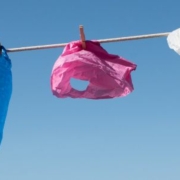What’s the deal with the Plastic Soup again?
March 15 2024 That’s what readers of news site nu.nl on their comment platform Nujij were wondering. In a recent […]
During the festive season, there is a 30% increase in plastic use. Especially packaging contains a lot of plastic. In 2018, the equivalent of the weight of 650 000 reindeer in packaging was thrown into landfill. Besides that, Christmas products and gifts are often made out of plastic. That can be done differently! Therefore, we have listed several tips and tricks for you. Take a quick look at how you can reduce your plastic footprint.

A study in 2016 showed that consumers in the UK threw away as much as 365,000 km of wrapping paper. That could wrap the earth nine times! You can easily use this gift paper a second time. Especially if the presents are wrapped without tape. This sounds more complicated than it is. Gifts can also be wrapped very nicely with old newspapers, magazines or fabric. Fabric too can be reused when the gift is unwrapped. As a finishing touch you can add a pine branch with string or reused ribbon to the present.
Also, the presents that are wrapped often contain a lot of plastic. And it’s cliché, but many of these gifts end up unused in the back of a cupboard somewhere. So buy a gift that you know someone would really like. You can often buy these gifts second-hand (online or in a shop). More personal gifts are also appreciated. For example, give a biscuit tin containing your favourite home-baked biscuits, a homemade booklet with ‘vouchers’ or a handmade photo book with your favourite moments of the past year.
Would you rather give something new though? Then check out our business partners who are working with us to close the plastic tap. Like the microplastic-free cosmetics brands that carry our zero-inside logo. Of course, you can also give a gift voucher. Fortunately, you can increasingly buy and print these digitally as an alternative to a plastic card. Did you know that there are also special sustainable gift cards, with a percentage of the gift card donated to Plastic Soup Foundation? Like, for example, the Nationale Groene Kadobon (in Dutch) that allows you to buy sustainable products and make a donation to Plastic Soup Foundation. The Giffy gift card, which you can give with a special personalised video message. Or the YourGift card (in Dutch), which you can use on the Plastic Soup Foundation donation page.
Many Christmas decorations are made of plastic while there are lots of great plastic-free decoration options. We have listed a few for you below. For more inspiration, you can have a look online, like on Pinterest (zero waste Christmas decorations).
Even if you don’t want to craft, there are plenty of options. Check out thrift stores, you can buy baubles for next to nothing. Or swap your Christmas decorations with those of your neighbours this year and your house will look completely different. The most sustainable tip? Be careful with the materials you already have in your home. Party decorations will last for years if you store them neatly.
We spend more than 85 euros per person on clothes during the holidays while most Christmas items are worn less than three times! Moreover, many clothes we wear during the holidays contain synthetic materials. In fact, research by Hubbub shows that a “Christmas jumper” is almost always made of plastic such as polyester or acrylic. Acrylic is a common type of plastic in clothing.
Synthetic (=plastic) fabrics release microplastic fibres during production, wearing, washing, and depositing of clothing. Therefore, consider piecing together your Christmas outfit in an alternative way. Have you already looked into a friend’s closet or already been to the second-hand store or visited Vinted? Check out this guide for more tips to reduce your plastic fashion footprint. If you really want to wear a new outfit, choose plastic-free materials.
We wish you a happy and plastic-free December month!
March 15 2024 That’s what readers of news site nu.nl on their comment platform Nujij were wondering. In a recent […]
The first Impact Fair is Europe’s largest Impact Experience. An interactive ‘immersive’ experience of impactful examples.
The waste-export to countries outside of the EU has been restricted The Netherlands is against a carpet ban on shipping of plastic waste.
The waste-export to countries outside of the EU has been restricted The Netherlands is against a carpet ban on shipping of plastic waste.

 PLASTIC SOUP FOUNDATION DISAGREES WITH EUROPEAN CONSUMERS’ ASSOCIATIONS
PLASTIC SOUP FOUNDATION DISAGREES WITH EUROPEAN CONSUMERS’ ASSOCIATIONS